Text
“Since the rise of The Beatles, John has gained the image of the vicious, outspoken Beatle. How did he like it? “It’s been very useful,” he replied. “A lot of slimy reporter types seem to have got to fear me, it’s fantastic. I didn’t work for the title of the vicious Beatle, the biting Beatle, the one with the rapier wit. It’s a load of crap. It’s handy being tagged like this. When I meet intelligent and hip people, I have to be on my toes not to disillusion them. The people who have fallen for my image and publicity go to Paul, which I think’s funnier still. “Paul can be very cynical and much more biting than me when he’s driven to it. ’Course, he’s got more patience. But he can carve people up in no time at all, when he’s pushed. He hits the nail right on the head and doesn’t beat around the bush, does Paul.””
— John Lennon, interview w/ Ray Coleman for Melody Maker. (April 10th, 1965)
#the quote of all time#john and paul#the role of image#'it's been very useful'#mirror image#fav#1965#april 1965#understanding john
894 notes
·
View notes
Photo

3K notes
·
View notes
Note
Paul being friendly and consistently trying to reach out to John to establish a relationship while John does everything he can to close that door—just one of the many differences in the way they handled the trauma of that partnership? Paul being in denial of their issues and just wanting John in his life in some semblance and John being all too painfully aware of that trauma/toxicity and as such cannot have Paul in his life at all. It seems like Paul wanting to be buddies again would be offensive to John.
I have been thinking about this one a while, and I do wonder if the offence, such as it was, came not from Paul being in denial (perhaps so in public, but not necessarily in private?) but in them having very incompatible ways of wanting to address the issue, or heal the proverbial "wound". Paul would rather they revert to, well, their last save, when they were more or less safe in each other, and he seemed to believe there was something worthwhile in rebuilding their friendship from that point.
John, on the other hand, could not cope with that, even if it meant returning them to a previous place of comfort, because to not move forward sometimes feels like denying the bad even happened at all. I'm not saying here, "Paul was trying to gaslight John into being his friend again" or whatever, I don't think that's what it was. His desire for reconnection was genuine and plain to see. But sometimes when you refuse going backwards and instead search for a clean slate, and when you badmouth your own past and reframe it, what you are trying to do is not act like a quirky random angry girl, but to find control over your own self, and the things you had experienced but didn't have an outlet for expressing. In a relationship that was built on so many unspoken rules and unexpressed affection, to continue to Not Speak on things would be unbearable. Things unspoken aren't real, and it's much easier to deny something neither of you ever spoke about, despite it very clearly changing you and your relationship. So cutting the thing (the relationship) at the root would not only allow him to hold it in his hand, but to examine the point of rot in it that he had felt creeping up before, but could never look directly at.
And again, besides the issues in their private relationship, a lot of the pain and the trauma that came from the Beatles had to do with fame. And the differences in how each of them dealt with its aftermath. Personally, I don't think John's isolated NY aristocrat life was a healing balm for his specific trauma, but neither would touring and acting chummy with Paul be. Sometimes you don't get to return to the good old days. You have to move forward and build something else atop it, even if it's not as sweet as it once was.
#have i reblogged this yet?#still one of my favorite things ive read here#fav#the 1970s#to post#drumsalongthemersey#the breakup#fame is hell#john and paul#john pov
37 notes
·
View notes
Text


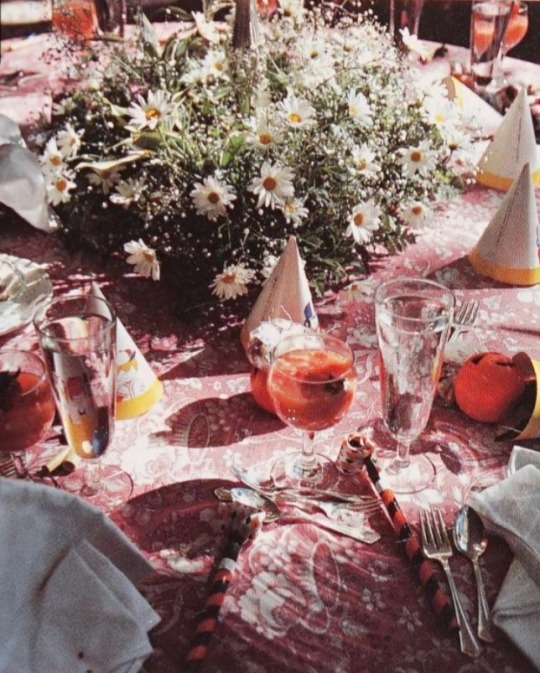

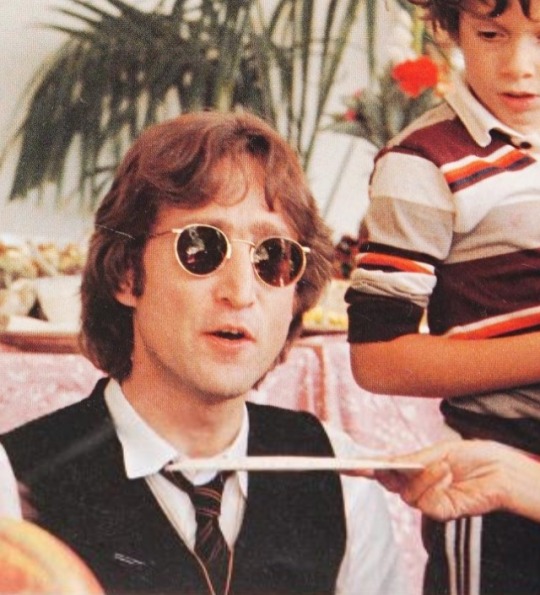

John Lennon and Sean Ono Lennon on their birthday party at Central Park's Tavern On The Green, October 9, 1978. ㅡ From the book "The John Lennon family album" by Nishi. F. Saimaru.
#whats with the necklace#another potentially cursed object?#jk jk#the dakota years#october 9#bug families#sean#john
201 notes
·
View notes
Text
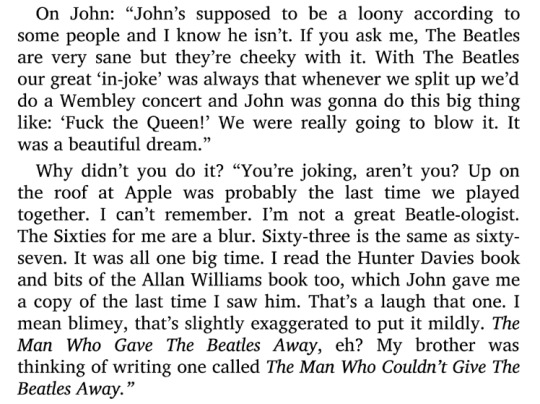
Melody Maker, October 4th 1975
Paul interviewed by Chris Welch
#hmm#‘we were really gonna blow it’#interesting#sticking a pin in it#when the bubble bursts#john and paul#allan williams#his book came out in 1975 so this confirms they did meet sometime that year despite the NOLA bust#oh and this is from october so it'd be before the christmas 1975 meeting yoko's pr guy wrote about#so at least two 75 meetings then#paul interview#the 1970s#1975#bug book list#up on the roof#just seeing he said it like that gets me good
109 notes
·
View notes
Text
Can I take my friend to bed?
#👏👏👏#you nailed the j i love you and blue i love you parts#i can’t stand this song most days actually but the way paul speeds thru the alphabet to land on j just before the i love you#closest he got to saying it out loud until silly love songs#the can i bring my friend to bed just puts it over the top#vid recs#two of us film
230 notes
·
View notes
Note
The more accounts I read of John analysing Paul's solo songs to death, the more impressed I am that the myth of John Lennon who moved onwards and upwards and barely spared a thought for Paul in the 1970s has been so strong for 40 years. I know some of them are from questionable sources but there seem to be so many of them, you have to think they're probably true in general if not in every specific example.
I do know what you mean, Nonny. But, I guess the fact that they never publicly reunited and John continued to be very... mixed in his official accounts of his feelings are hard to shake. Also, he was very open that he was listening to Paul's songs and that he had Thoughts on them. I guess that very much fits into the narrative of, "They were rivals and not friends", so it still fits the overall arc.
It's funny, though, isn't it about all the accounts of John talking about Paul. Like, I wonder how much of that is a) made up and b) sort of self-selected. What I mean is, that sometimes when Paul talks (so much) about John and not say, Linda, I've got to assume he's doing it because he knows that's what people are more interested in hearing about. Like, not that he minds and not that he isn't thinking of John sometimes when he isn't asked. But, there's got to be an element of that at play. They both know that when someone is talking to them that they are, forever, Beatle John and Paul, so that's in the air all the time and means they're more likely to bring one another up.
So, with John, how often are those accounts the result of the person writing about it bringing up Paul first? How much additional emphasis are they putting on what was said because it makes a better story/it's the thing they cared about most. Was this just a throw away comment they made and didn't even really believe but now it's been written down while all the other inane stuff he also said like, "Bowie wrote that about me" or "I wonder if that book was inspired by Yoko's poems" never was?
This isn't in response to anything in particular. This is the cycle that goes around and around in my brain:
They adored each other - loved each other - until the very last moment (and beyond)
They remain(ed) very weird about one another
But they never got it together to mend things
Perhaps the will wasn't strong enough to get over what went down
Because they didn't want to be defined by one another
They worked hard to move on and they did move on. That's probably good, actually
But, Paul was hanging out in John's flat months before he died
They did keep trying to work together
The hurt was so deep that it was hard for them because they loved each other
Wow, they sure did say a lot of weird things that suggests that they never moved very far on down that long and winding road...
Anyway, just a little insight into the things I think about on the train into work in the mornings...
#i think about this a lot with the 70s accounts#are they all inflated and puffed up bc everyone in the music industry knows that if you have a story about one of them#talking about the other it will get attention and give you attention#but there's some stuff that has little agenda attached to it like sean remembering paul at the dakota in 1980#its a problem#but i think the story stays pretty consistent#the 1970s
18 notes
·
View notes
Text
October 8, 2010: NPR Fresh Air revisits a 2000 interview with Jon Wiener about his book Gimme Some Truth: The John Lennon FBI Files [listen] [full transcript]
GROSS: Did you find anything in the FBI files that were released to you that indicated that the FBI went beyond surveillance - that they ever tried to set Lennon up?
Prof. WIENER: You know, there's like a couple of documents. Their concern was that Lennon would participate in some kind of concert, rally, anti-war demonstration outside the Republican National Convention. And there's a memo from J. Edgar Hoover to the head of the Miami FBI office that suggests that if Lennon could be arrested on possession of narcotics charges he would become more immediately deportable. Now this seems to me an effort to set Lennon up for a drug bust. The FBI doesnt enforce possession of narcotics charges, that's a state offense, this is not part of what the FBI is supposed to be doing. I then filed a Freedom of Information request with the Miami FBI office, asking for their files on Lennon, to see what their response to this was. They replied to me that their John Lennon file had been destroyed as a part of a routine file destruction procedure.
GROSS: Hmm.
Prof. WIENER: Now I have to note that - know that Lennon files were collected in five other cities and none of those places destroyed their Lennon file, so we wonder what was in the Miami Lennon file that was destroyed.
#john lennon#richard nixon#j edgar hoover#gimme some truth book#politics and the beatles#activism#audio#bug book list#mine#the bit about the miami file being destroyed coupled with the denial nondenial bit about the wiretapping is most interesting#john was paranoid but not by much the files show he was surveilled hes politically targeted and effectively it worked in shutting him up#the 1970s#1971#1972#1973#oh and that the files wrap up when hoover dies#but the problem persists for 2 years he's under an order to leave the country in 60 days and has to request extensions over and over#this is in addition to the apple legal stuff and the copyright cases#i think i need a courts and john tag no wonder why he was a pro by 76
9 notes
·
View notes
Photo

Also on August 9, 1974: President Nixon resigned.
With that, the wind down of deportation proceedings against John Lennon began.
Surveillance of him under Attorney General John Mitchell had begun in early 1972, following the December 1971 John Sinclair benefit. With a re-election year looming and newly-enfranchised 18 year olds as part of the mix, the administration would take no chances on testing the political sway of an ex-Beatle.
Using his October 1968 drug conviction as a pretext, John was labeled an “undesirable” and targeted for deportation. Though public support was brought to bear, the stress of the case did impact him (and his art) during the period. Once Nixon was gone, the prosecution continued, though perhaps without the same urgency; George used his December 1974 visit to the White House to petition President Ford personally but once set in motion, it was difficult to stop.
But October 1975 saw John win his case against the government on the grounds of “selective prosecution” (convicted murderers had an easier time getting in and out of the country than John did), and in July 1976 - just weeks after the nation celebrated the Bicentennial - John received his long-coveted “Green Card” (blue, actually) that empowered him to cross the US border freely.
* * * *
#i hate this whole sequence of events#nixon gonna nixon and all that but it's hard not to think what ifs? like if he wasn't targeted like this#would he have really stayed?#idk just seems like this really made it impossible for him to do anything but fight it#the 1970s#richard nixon#immigration#1971#politics and the beatles#1976#drug bust#activism#lawyers and the beatles#time machine goals: stop john from doing the sinclair benefit? nah that was a good cause guy was targeted and got 10 years for 2 joints#i believe john later regretted befriending abbie hoffman#that said nixon was an asshole who would have gone after him regardless just for the threat of being able to mobilize young voters#has anyone read the gimme some truth book? by the guy who read the fbi files on john#listening to the author's npr interview so john never did get confirmation the fbi had him under surveillance before he died#tho he was paranoid for years ab it#he would have loved to read the file where they had a wanted poster of him and used a photo of david peel lmao#lets give it up for george who gets to the white house and is like hi mr president plz stop targeting my friend
109 notes
·
View notes
Text
On this day, July 27, 1976, after a five-year trial with attorney Leon Wildes, John Lennon's "Green Card" application was finally approved at the Central New York offices of the Immigration and Naturalization Service of the United States


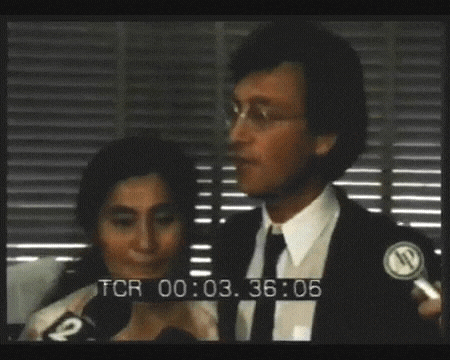


#nooo#i just came across orphanbeats prompt about an AU where john is denied it and kicked out#and i hated how my first thought was that would fix it#the only time im against immigration#being in beatles fandom is kinda like being down the climate crisis well#in both youre just wishing for a time machine#the 1970s#politics and the beatles#1976#lawyers and the beatles
55 notes
·
View notes
Photo
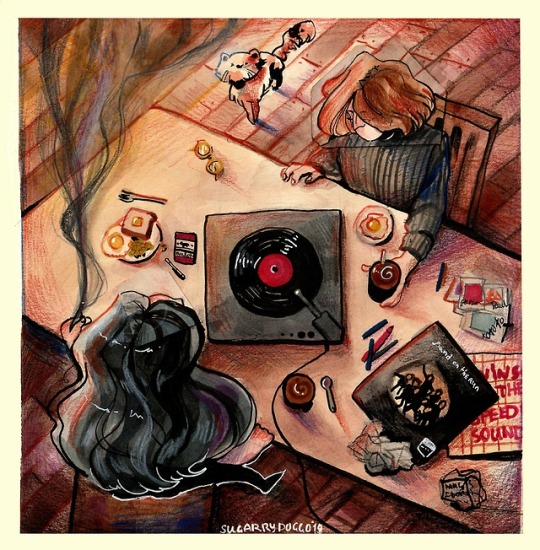
586 notes
·
View notes
Video
youtube
Oh, for what it’s worth, no less than John Lennon loved the song. I spent a long time talking to [photographer] Bob Gruen once, it was great as we talked about a lot of stuff that he doesn’t usually get grilled on. One of the things that came up was the times he spent with John listening to the radio. Bob singled this song out as one he and John would listen to and how much John loved the song. John took the song quite personally, and saw it as Paul sending a message to him: ‘Yeah, I know you think I only write silly love songs, but I love you.’ Bob said John specifically mentioned the ‘I love you’ refrain as being a message from Paul to him. We can speculate all we want, but I have no reason to doubt the word or memory of a guy who sat in the Dakota bedroom with John and listened to this song with him.
— gswan, c/o Steve Hoffman Music Forums. (October 28th, 2010)
#a reminder that no matter how silly you feel about interpreting songs john lennon still has you beat#john stories#john and paul#silly love songs#wings#1976#the dakota years#bob gruen#message songs#the 1970s
574 notes
·
View notes
Text
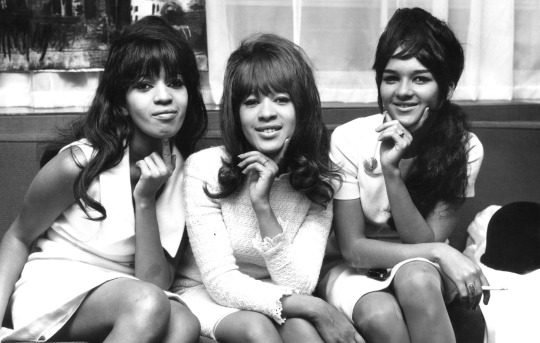


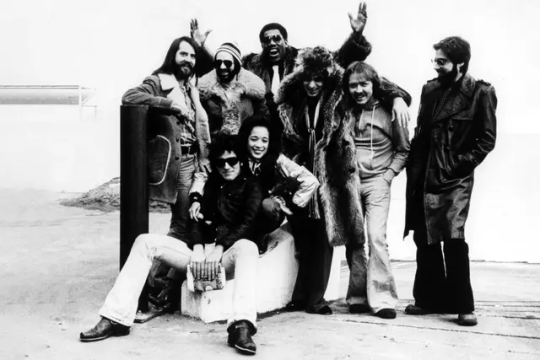
Q: Aug. 26 will be your first time in Asbury Park in 15 years. How are you feeling about getting back to the city, and do you have any particularly fond memories of playing the city in the past?
A: Are you kidding me? I can’t wait to get back there! Those were great times for me. You know I came back east in '74 and really needed to make music. People may not know it, but I never wanted to leave rock 'n' roll.
Let me tell you (a) little story of how I got to Asbury Park in the first place. I am walking down the street in New York City, mid-'70s and I hear this voice yell out, “Hey Ronnie, Ronnie Ronette,” so I turn around and it’s John Lennon. I actually met John the first night we landed in the U.K. in January '64. Anyway, John asked me how am I doing, and I tell him, "Not good, I need to make music." John said he was busy being a house husband taking care of his son, but introduced me to his engineer, Jimmy Iovine (Walls and Bridges).
That night, Jimmy invited me down to the Record Plant where he was working with a band from Jersey. When I walked into the studio, I met Little Steven (Van Zandt), who was producing Southside Johnny. And (Bruce) Springsteen was there, too, and right on spot Bruce re-wrote a song for me and Johnny to sing as a duet, “You Mean So Much to Me Baby.” They were all excited when I showed up, and more excited when I started to sing. I was surprised they knew me.
After that I started hanging out in Asbury Park with the guys, doing shows at the Stone Pony and all over the place. The second part of my career really started in Asbury Park. Those guys treated me like a sister and really helped me get back to what I loved doing, rock 'n' roll. They always looked out for me, and would never let me get into any trouble!
Q: Forty years ago, you partnered with the E Street Band for “Say Goodbye to Hollywood.” What are your memories of working with the band on that classic single?
A: I was going back and forth to L.A., so the times in the studio with Bruce and the boys were great. The times in L.A. were very difficult for me. Everyone was working hard to find the right song for us to record. And of course Billy Joel, who wrote "Hollywood," used to open up for the Ronettes on Long Island in the '60s when he was in the Hassles.
I also loved the ‘B’ side which Little Steven wrote for me. Those guys were like big brothers to me. It’s the only record outside of their work with Bruce where they are credited as the E Street Band. I look back and really appreciate those days. Not one memory, lots and lots of them, so much fun and a sense of freedom for me which I desperately needed. The guys were great and exactly what I needed at that moment in my life.
From Ronnie Spector's Interview in Asbury Park Press (August 22, 2017)


From Billboard Magazine (July 16, 1977)
youtube
Ronnie Spector sings Say Goodbye To Hollywood live on the David Essex show (September 13, 1977)
#when john ran into ronnie and gave her the assist she needed to get back in the game#ronnie spector#john lennon#e street band#jimmy iovine#steven van zandt#john stories#timeline puts it after walls and bridges (1974) and born to run (1975) so after his break with phil spector#bruce springsteen#the ronettes#1976#the dakota years#mine#her book says it was 1976 and that sounds about right#she escapes phil spector in 1972 divorces in 1974#do you believe she only got 25000 off the guy and he kept up withholding royalties into the 00s#photos: ronettes with george (1964); ronnie with john in LA (1974?); ronnie with the e street band (1977)#in conclusion always help make connections between friends#you never know how many careers you may save
10 notes
·
View notes
Audio
Ronnie Spector’s cover of the Harrisong “Try Some, Buy Some” (1971).
“You was written for Phil Spector’s wife Ronnie. I wrote it and laid the track down with Leon Russell. I tried to write a Ronette sort of song. We never got to make a whole album because we only did four or five tracks before Phil fell over, and then he decided to release Try Some Buy Some as a single.” - George Harrison, I Me Mine (1980)
“I was friends with the Beatles, real friends — we’d sit on the floor at home and have finger sandwiches and play 45s. When I came to the U.K. to join [the band’s] Apple Records, I didn’t recognize George Harrison. It was during the Maharishi days, and George had the longest hair. He immediately started playing me this song, and I said, ‘George, I can’t sing this kind of song!’ He says, ‘I know, Ronnie. I wrote it, and I don’t like it!’ [The track was produced by Phil Spector.] It had all these strings and the arrangement was awful, [but] we were friends, so it wasn’t like we could just shake hands and walk away. Later on, George recorded it, and he had my voice on it and his voice on it, answering each other. And after that came out, it became a fan favorite.“ - Ronnie Spector, Entertainment Weekly, 11 April 2016
“‘George, what does that mean? You tried what? You bought what?’ I really didn’t know about what he was talking about. So he explained about the Maharishi, and how they tried things, and drugs, and it didn’t work. I said, ‘But George, I never did drugs. I can’t sing a song like this!’ He said, ‘Ronnie, you can sing any song.’” - Ronnie Spector, Goldmine, 8 August 2011 (x)
The B-side of the single is “Tandoori Chicken”:
“[We] knocked off a B-side for a Ronnie single on Apple in ‘71. The B-side’s a killer, 'Tandoori Chicken.’ It’s a 12-bar thing done on the spot with Mal our roadie and Joe the chauffeur — 'I told Mal/ my old pal/ to go with Joe/ and they should go/ and get some tandoori chicken.’ And a great big bottle of wine! [laughter] We did it one-take, with a lot of improvised scat singing in the middle. It’s hysterical.” - George Harrison, Musician, November 1987
#george stories#'ronnie you can sing any song'#aw very sweet#but also accurate#the george version is on living in the material world#i like both versions she makes it her own thing but its good to have the songwriters version too#apple artists#ronnie spector#relistening to her 1987 solo album its considered a flop but its so quintessential 80s sound i cant help but love it#(she gave an assist to the e street band when they needed it)#if that sound isnt your thing check out her punkish new wave 1980 album sirens actually my favorite#(helped by friends in the ny punk scene it acts as a sort of independence declaration from pos phil spector)#she has a dakota john story i need to share
54 notes
·
View notes
Photo
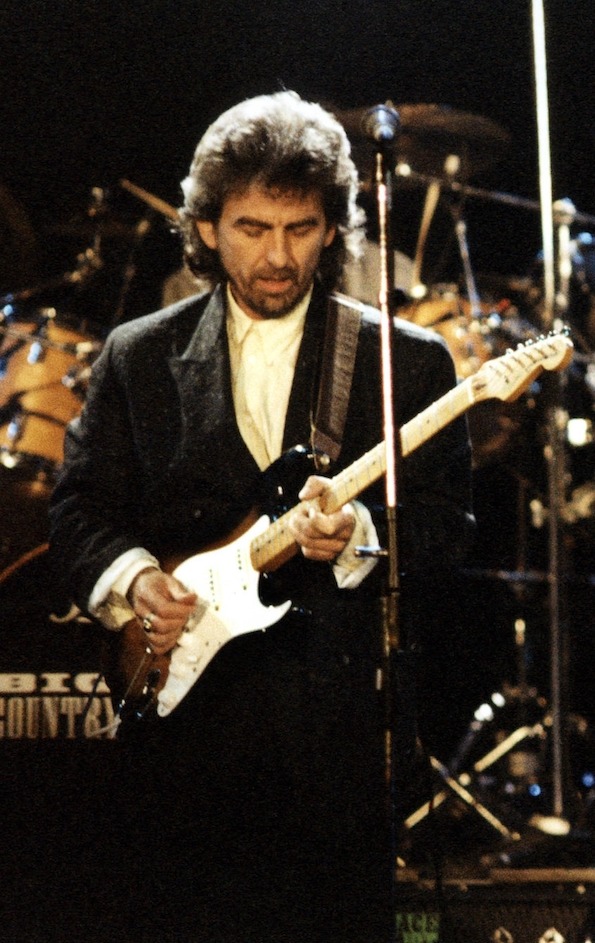
Prince’s Trust Concert, June 5, 1987; photo by Pete Still/Getty Images.
“I have a conflict; I don’t particularly want to play to audiences. I like to play in a band, but I don’t like the adulation, the attention, all that focusing on *me*. I like the idea of playing in a band and the people liking the music without this specific *adulation*. I don’t like that at all. It’s unhealthy to be *the star*. You know, it’s a business and people are dependent on fans. They whip up hysteria to collect fans so that they can make more money. But I don’t see it that way. I am — or was — a musician. I wasn’t supposed to be a novelty that people came to look at, like we became in the Beatles. We became a kind of obsession. And that side of it makes me uncomfortable. But having said that, it’s fun to play every night and see if you can do better each time.” - George Harrison, RCD, 1992 (x)
#i love this quote#theres a difference#between wanting to be successful as a musician and dealing with the idolatry that comes with big fame#george was just like plz dont#george
83 notes
·
View notes
Note
I find Paul crediting John with inspiring the lyrics to Yesterday in that same Ivor Novello Awards interview to be a particularly fascinating "lost along the way" tidbit in the story of Beatles authorship. Of course, he could be exaggerating John's involvement for the sake of putting up a united front. But I doubt he is. Especially now that we know for a fact they were right about Yellow Submarine in that interview. Inspiring isn't writing, but that's way more involvement than legend allows
Ah yes! Thanks for the reminder. Here's the bit about "Yesterday":
PAUL: (laughs) "This is Paul, taking up the story in a slight holiday-villa in Corsica. Stumming away on a medieval guitar, I thought (sings) 'Scrambled Egg'. But I never could finish it, and eventually I took it back in with the ancient wisdom of the east, John came out with (sings) 'Yesterday.'"
I've said this before, though perhaps not publicly, that attribution in a creative team is really hard. I produce theater with my BFF and we have these sessions where we kick around ideas for how to stage things and what to adapt and how to achieve an effect and to be honest, I don't remember who said what the next day, let alone a year on. So it's very easy for me to believe that 1) they are so involved in each other's process, even later when they're writing more separately but USED TO being in each other's brains, that it's hard to tell and 2) they aren't necessarily lying on purpose when the stories don't match up.
But yeah I don't remember hearing that John contributed the word "yesterday" in most other tellings, but we know Paul was casting about for the right words for months. And we know from Get Back that their process involved sticking in words that scanned until one clicked.
So it's believable both that this happened, and that it would get sort of sanded off along the way.
#great point about get back#bc my mind went there too when i heard that story#1965#get back#yesterday#paul's got the melody as far back as jan 1964 bc he plays it for george martin in paris#partnerships#songwriting#i think it's a mistake when we get too into the model of this is a john song this is a paul song#its really left over from the 70s john rhetoric when he lied about them never writing together#lennon mccartney#ivor novello awards#1966
14 notes
·
View notes
Audio
November 12th, 1964 (Playhouse Theatre, London): While recording a session for BBC radio show Top Gear, John makes several attempts to achieve the feedback at the beginning of ‘I Feel Fine’ and successfully kick into the song to the Beatles’ amusement.
JOHN: [Italian accent] Do you like it?
PAUL: Don’t like it.
JOHN: You don’t like it?
PAUL: Don’t like it.
#wow this is long#turn it up you can hear them trying to get it right#1964#audio#false starts#precious#i feel fine#bbc live recording
301 notes
·
View notes